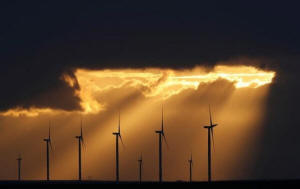|
The
government said the proposed reforms will cut in half the
average time it takes for wind power projects to be completed
and connected to the French electricity grid.
If successful, it could counter long-running opposition from
activists who have frustrated the country's attempts to reach
renewable energy targets, which include aiming to have up to 26
gigawatts (GW) of offshore wind generation capacity by 2023
compared to 12.9 GW currently.
Global installed wind energy capacity has grown on average by 22
percent a year since 2006 as countries turn to low-carbon
sources to produce electricity.
Renewables, including wind, solar, bioenergy, hydropower and
wave and tidal energy, could account for nearly 30 percent of
the global energy mix in five years' time, according to the
International Energy Agency.
"Currently it takes seven to nine years to develop offshore wind
projects," said French junior ecology minister Sebastien
Lecornu, who added that the reforms would halve that time.
French activists opposed to wind farms have been systematically
filing appeals against wind projects through administrative
courts. Those courts take years to hear cases, thus delaying the
completion of projects.
"The direct consequence of this is a lengthening of the time it
takes to complete a project -- seven to nine years on average --
compared to three to four years in Germany," the government said
in a statement regarding its new proposals.
Some 70 percent of authorized projects are facing appeals in
Administrative Tribunals courts, the government said, adding
that its reforms would remove a level of jurisdiction in the
appeals process.
(Reporting by Bate Felix; Editing by Sudip Kar-Gupta)
[© 2018 Thomson Reuters. All rights
reserved.] Copyright 2018 Reuters. All rights reserved. This material may not be published,
broadcast, rewritten or redistributed.

|
|







